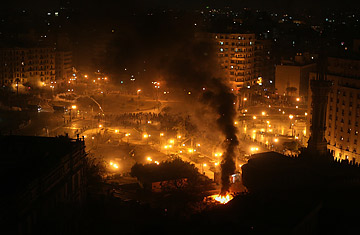
Police gather in Tahrir Square as a car burns in Cairo
At midday on Friday, Jan. 28, I headed toward the Mukaram Mosque, just off Cairo's Tahrir Square, the focal point of the demonstrations of the previous three days. Plainclothes police, supported by antiriot cops in full gear, were turning away a handful of worshipers.
"The mosque is closed for construction," said a mustachioed policeman in a beige jacket.
"It was opened yesterday!" screamed a visibly angry gentleman with graying hair. "So now you are closing the house of God too?"
On another side of the square, some 500 plainclothesmen huddled in a corner, seemingly listening to directives from somebody I couldn't see. I stopped for a moment, pretending to catch my breath in the hope of hearing what was going on. Half a dozen of the men came up to me immediately and forcefully told me I was not allowed to stand anywhere near them. There were no civilians near the square.
To find the civilians, I headed to Mustafa Mahmoud Mosque, in the Mohandaseen neighborhood of the capital, an upper-middle-class area bordered by poorer sections. Many orange ambulances and fire trucks stood at the ready along the main road, Batal Ahmad Abdel Azia Street. Several thousand people had gathered at the mosque, mostly young men but also many young women in hijabs as well as few older folks. I joined them as they marched down the main street toward Tahrir Square. "The people want the regime to fall," they chanted. "Let Hosni Mubarak fall!" "Freedom! Freedom!"
The atmosphere was peaceful despite the shouting, with several protesters scolding a handful of others who picked up stones in anticipation of tossing them at the police lines. "We don't want to cause any destruction," one young man said as he took the stones from the hand of another.
Some of the protesters were prepared with surgical masks. People living in the high-rise apartments lining the street watched from their balconies. Many clapped and chanted along with the protesters. An elderly lady punched her fist in the air in time with the chants. "Come down, Egyptians, come down!" the demonstrators intoned to the residents.
"They are scared," said Sharif al-Rubaie, 31, referring to the government. "They are really scared of us." Gesturing toward the crowd surging onto the street, al-Rubaie continued, "These people aren't political or members of political parties. They've had enough of the lack of dignity — the way they are harassed by the police."
I turned to a young man walking beside me. "Where are you from? What's your area like?" I asked. "My area is called worries, unemployment and poverty," he replied. "And you'll find many just like it here." Mohammed, 25, is a business-school graduate increasingly frustrated by his inability to find work. "I just sit on the Internet all day. That's not what I want my life to be. Today is the first time I've ever participated in a demonstration. I felt like maybe it might make a difference. Look at these people in the buildings," he said, gesturing toward the apartments. "They are with us, but they are scared. We can't all be scared."
"Ya Gamal, tell your father that the Egyptian people hate you," the crowd chanted, a reference to the son and presumed heir of President Hosni Mubarak.
Tear gas came from seemingly out of nowhere, quite a distance away from Tahrir Square. One canister landed very close to me, rapidly followed by a second and a third. The crowd panicked and started fleeing down a side street, but there was no respite from the stinging fumes that immediately blanketed the area. I closed my eyes and pulled my scarf over my nose and mouth.
"See this, my sister?" asked a protester. "Write it down. Is this any way to live? Look how Mubarak treats his people. And why? Because we want a better life?" The man screamed out to me as he ran past.
A young man with a bottle of cola urged others to dab some of the liquid in their eyes. Some were prepared with onions and vinegar-soaked scarves to lessen the effects of the gas. They were shared all around. People offered one another water.
"This is the beginning of the end for him," a young man shouted to the crowd. The people were regrouping and trying to find another way to the square. They headed down an alternative route. A burly bearded man, also named Mohammed but older (35), wearing black plastic sandals, offered me some water. "Don't wash your face with it. It won't help," he said. "But have a drink." He said he was a taxi driver and also a veteran protester, and he offered advice to those overcome by the fumes: "Here, put Pepsi on your eyes — it won't burn as badly."
Desperate to stop the stinging, I tried it. It calmed my eyes somewhat. But they were still burning. A young man in a kaffiyeh saw my discomfort and poured some vinegar on my scarf. "Here, breathe this in," he said. "It will help." It did.
